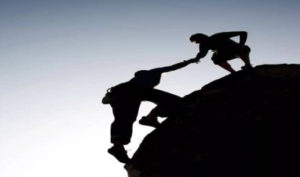Hope as an Important Piece of Wholehearted Living.

Hope as an Important Piece of Wholehearted Living.
I always thought of hope as an emotion like a warm feeling of optimism and possibility.
But I was wrong.
I was shocked to discover that hope is not an emotion; it’s a way of thinking or a cognitive process.
Emotions play a supporting role, but hope is a thought process made up of what Snyder calls a trilogy of goals, pathways, and agency.
-
Also read: The Continually Growing Brain.
Hope happens when;
- We can set realistic goals (I know where I want to go).
- We can figure out how to achieve those goals, including the ability to stay flexible and develop alternative routes (I know how to get there, I’m persistent, and I can tolerate disappointment and try again).
- We believe in ourselves (I can do this!).
So, hope combines setting goals, having the tenacity and perseverance to pursue them, and believing in our abilities.
And, if that’s not news enough, here’s something else:
Hope is learned!
According to Snyder, we learn hopeful, goal-directed thinking in the context of other people.
Children most often learn hope from their parents.
Snyder says that children need relationships characterized by boundaries, consistency, and support to learn hopefulness.
I think it’s so empowering to know that I can teach my children how to hope.
It’s not a crapshoot.
It’s a conscious choice.
Men and women who self-report as hopeful put considerable value on persistence and hard work.
The new cultural belief that everything should be fun, fast, and easy is inconsistent with hopeful thinking.
It also sets us up for hopelessness.
When we experience something that is difficult and requires significant time and effort, we are quick to think,
- This is supposed to be easy;
- it’s not worth the effort,
- or, This should be easier:
- it’s only hard and slow because I’m not good at
Hopeful self-talk sounds more like,
- This is tough, but I can do
Some believe that everything worthwhile should involve pain and suffering.
- Given your ability to chase down a goal and bulldog it until it surrenders from pure Believing that unless blood, sweat, and tears were involved, it must not be that important.
- Is not appropriate.
We develop a hopeful mindset when we understand that some worthy endeavors will be difficult time-consuming and not enjoyable at all.
Hope also requires us to understand that just because the process of reaching a goal happens to be fun, fast, and easy doesn’t mean that it has less value than a difficult goal.
If we want to cultivate hopefulness, we have to be willing to be flexible and demonstrate perseverance.
Not every goal will look and feel the same.
Tolerance for disappointment, determination, and self-belief are the heart of hope.
There are a lot of people who have little tolerance for disappointment and have a strong sense of entitlement, which is very different than agency.
Entitlement is “I deserve this just because I want it” and agency is “I know I can do this.”
The combination of fear of disappointment, entitlement, and performance pressure is a recipe for hopelessness and self-doubt.
Hopelessness is dangerous because it leads to feelings of powerlessness.
We often think of power as negative but it is not.
The best definition of power comes from Martin Luther King Jr. He described power as the ability to effect change.
If we question our need for power, think about this: How do you feel when you believe that you are powerless to change something in your life?
Powerlessness is dangerous.
For most of us, the inability to effect change is a desperate feeling.
We need resilience and hope and a spirit that can carry us through the doubt and fear.
We need to believe that we can effect change if we want to live and love with our whole hearts.
Join Enlighten Knowledge WhatsApp platform.
Join Enlighten Knowledge Telegram platform.









Pretty! This was a really wonderful post. Thank you for your provided information.
Great post, I think blog owners should acquire a lot from this web blog its very user friendly.